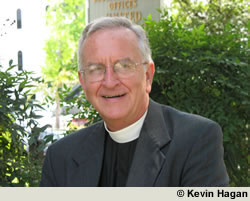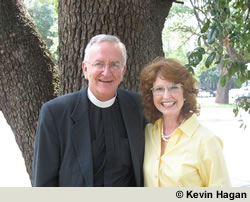Vol 8 Issue 1SectionsPriorities This IssuePrioritiesAfter Easter: Hope, and Happy Birthday!>> Extended Interview with Rev. Dr. Michael Kinnamon>> The Text, Webster, and Intuition>> TransitionsAnother Really Big Fish Story>> TraditionsEaster, Hope, and “Happy Birthday!”>> “Children, Have You Any Fish?”>> Wisdom & WonderingI am going out to fish>>
|
ArchivesAn Interview with Rev. C Dana "Dan" Krutz,By Janine C. Hagan and Dan Krutz
Janine: Dan, Thank you so much for agreeing to do this interview for ecumininet™ online! I would like to begin with talking about your involvement with Churches Uniting in Christ in the past as well as your present responsibilities. Will you share those with us? Dan: Janine, thank you. First, let me name the nine member churches of Churches Uniting in Christ: African Methodist Episcopal Church, African Methodist Episcopal Zion Church, Christ Church, Christian Methodist Episcopal Church, Episcopal Church, International Council of Community Churches, Presbyterian Church, United Church of Christ and United Methodist Church. As a young parish priest in a small town in Louisiana in 1975 I became acquainted with other clergy whose national church bodies are members of the Consultation on Church Union (COCU), since 2002, Churches Uniting in Christ (CUIC). My guess is we held one of the first COCU interracial, ecumenical Communion services in Louisiana among United Methodists, Presbyterians, and Episcopalians. That experience only whetted my appetite for ecumenism. When the plenary was held to form Churches Uniting in Christ, I was a delegate from the Episcopal Church, later becoming the Episcopal Church representative on the Coordinating Council of Churches Uniting in Christ. Janine: Would you please tell us about Churches Uniting in Christ? What exactly is it?
Practically fifty years later, we are still trying to fulfill the vision of these American Churches to live into Full Communion which means we recognize each others ministers and sacraments and engage in mission together. If you don’t like it that others can’t take communion with you in your church or that other ministers can’t serve in your church, then why not join CUIC. Introduce yourself to a local minister whose church is a part of CUIC! Janine: Do any churches join individually with CUIC or are they automatically joined with their denomination? How are individual churches expected to play a part? How does CUIC affect governing bodies? Dan: Churches join with their parent body. We have not had any requests, as far as I know, from local congregations. I think individual churches not part of a larger community of churches would be welcome to consider membership. Membership is based on a common agreement concerning doctrine, teaching, sacraments and governance. The relationship is more a covenant than it is a juridical one. Janine: How did racism come to be one of
the main focal points of CUIC? Dan: Overcoming racism has been a focal point of CUIC since its beginning. Remember that three of the member churches are predominantly Black or African American in their constituency, and the International Council of Community Churches is the product of a merger between a predominantly Black and a predominantly White church body. Racism may be the biggest sin that divides churches. We are working at it and have achieved some success. We have a long way to go because, as you know, it’s skin color, but it’s also class, background and culture. There are lots of hurdles to overcome, but we are on our way. Again, CUIC has 3 historically black Methodist Churches. The intention of CUIC is to have ecumenical relationships at the grass roots level. You know it is one thing to pass an overall sort of agreement of communion between Episcopalians and Lutherans and quite another to have that lived out at the local scene. All of this reminds us of an overall issue. I think that part of it is our culture where we have a McDonald’s and Wendy’s all on the same road and how that affects us. We have Baptists and Presbyterians and there is real reluctance where it is hard for us to join together in a way that might change our given method. That seems to be one of the stumbling blocks that all of us have to overcome and rethink as Christians. Janine: What concerns you the most about the future of CUIC? You just mentioned a little of the struggle with the consumer-driven and “me oriented” culture and churches taking that same posture. What concerns you the most about the future for Churches Uniting in Christ, not being able to come together as a whole? Dan: Right. Let me just say I’m very hopeful about moving into “Full Communion” at some point of the future. By “Full Communion” I mean a step toward a special kind of unity. It means the ideal; dissolving our boundaries and our governing structure struggles and learning to share our monies. But that is a long ways away. I don’t know if our individuality ethic will allow this to happen. That cultural drift is just one more facet of the challenge that we face. The chief obstacle that I see it is to come to a complete agreement about the role of a common church government, particularly with those that do not have an Episcopal form of government that have bishops. Janine: What about your position with the Louisiana Interchurch Conference? I am very interested in hearing about this. What would be the most interesting thing that you could share with us about the LIC and your position? Dan: The LIC is vitally committed to greater visible unity, but its beginnings were shaped by criminal justice reform rather than, let’s say, common bible study. The Louisiana State Penitentiary at Angola was the focus of the LIC’s efforts in the early 1970’s. Catholic, Protestant, Evangelical, Pentecostal, Baptist and other churches came together in a drive sponsored by the LIC to build an interfaith chapel at Angola, one of the first in the nation. The story of the beginning of Louisiana Interchurch Conference involves the penitentiary of Angola. One of my predecessors worked with a commission or task force to investigate criminal justice and the needs of the inmates at Angola. Out of that came the desire to have a chapel built at Angola, an interfaith chapel. Around 1980 or 1981, the financial drive took place and sponsored the campaign to raise funds. This was one of the few times that I am aware of when all the Christian denominations had a single cause. It was one of the high points when all the churches came together to do mission. Since then, we partnered with other groups to form the Prison Chapel Foundation and I think that there have been 8 to 10 chapels built. There are 4 underway right now. Once they are built, these chapels become state property and they are maintained by the state. It is the spiritual transformation for the inmates that we are working on. (Angola has its own society, around 5,000 inmates so it is like a small town.) Almost all the churches in Louisiana are involved with Angola in some way. Janine: OK, now for the “real” Dan Krutz, the person-outside-the-organizations. What about you and your background? Tell us a little about you. Dan: As a young teenager I remember trying to stop a fight between two boys at school. One of them ended up giving me a good sock on the chin! I’m unhappy with divisions and injustices—among individuals, nations, and churches. Faith was in the air we breathed in my growing up years in northeastern Arkansas. My grandfather was a lay evangelist-singer, mom and her sisters sang in the choir my grandfather directed the choir at the local Baptist church, and my dad’s uncle was a Methodist minister. Rather than drive me away, that environment was very appealing. I grew up in the Church. My sons have not caught the “religion bug.” They’re pretty normal young men starting out on their careers. Julie has been my companion, love, and alter ego throughout my adult life. Of course, sometimes I think I play second fiddle to Hunter, our Golden Retriever. But that’s okay; he’s much better looking than I am and easier to get along with! If you were to ask me how I’d like to end my ministry it would be having the scene in the movie Ferris Buehler’s Day Off where Ferris is singing along with half of Chicago during a parade the pop song, Twist and Shout. My ministry has been a wonderful parade with all kinds of characters along the way. Janine: Our theme for this issue of ecumininet™ online! is “ Summer, Sabbath, and Stillness.” What are your thoughts about “Sabbath”? Dan: When our people come together, they get out of their own religious traditions and whatever they are usually called and they are on an equal level with their peers. Ecumenical gatherings are in a sense, natural “Sabbath” times in these instances. In the Old Testament where Sabbath is discussed and in the seventh year debts are forgiven, I have been thinking that those “debts” would include forgiveness of sins against each other. So that “Sabbath” in an ecumenical way, would be forgetfulness of our divisions and our sins. In that new year when we come back from “Sabbath” we would start afresh. Janine: Dan, in considering your own personal calling/ministry what would you say brings you the greatest energy? Where do you receive the most joy and “life”? What would you name as your “purpose” in life and ministry? Dan: A neighbor of mine restores Corvettes. They come into his garage looking terrible, but you should see them when they come out! My calling is to be a restorer of people’s lives and the institution of the church. The lives of most people I know need restoration, and it’s certainly the case with the church—so bitterly divided and its image tattered to shreds. That’s the ministry that I am called to live out. ©2006 Janine C. Hagan and C. Dana Krutz | View
for Printing
|
| All Content Copyright © 2008 ecumininet online!, Spiritual Systems Inc. - Site Design & Maintenance By Atomic Pixels | ||

 Dan Krutz’s office is in historic downtown Baton Rouge, Louisiana,
overlooking the old Governor’s Mansion. This is where we met
on a hot, humid morning several weeks ago to talk about Churches Uniting
in Christ, the Louisiana Interchurch Conference, and Dan’s own
experiences.
Dan Krutz’s office is in historic downtown Baton Rouge, Louisiana,
overlooking the old Governor’s Mansion. This is where we met
on a hot, humid morning several weeks ago to talk about Churches Uniting
in Christ, the Louisiana Interchurch Conference, and Dan’s own
experiences.  Dan:
Dan: